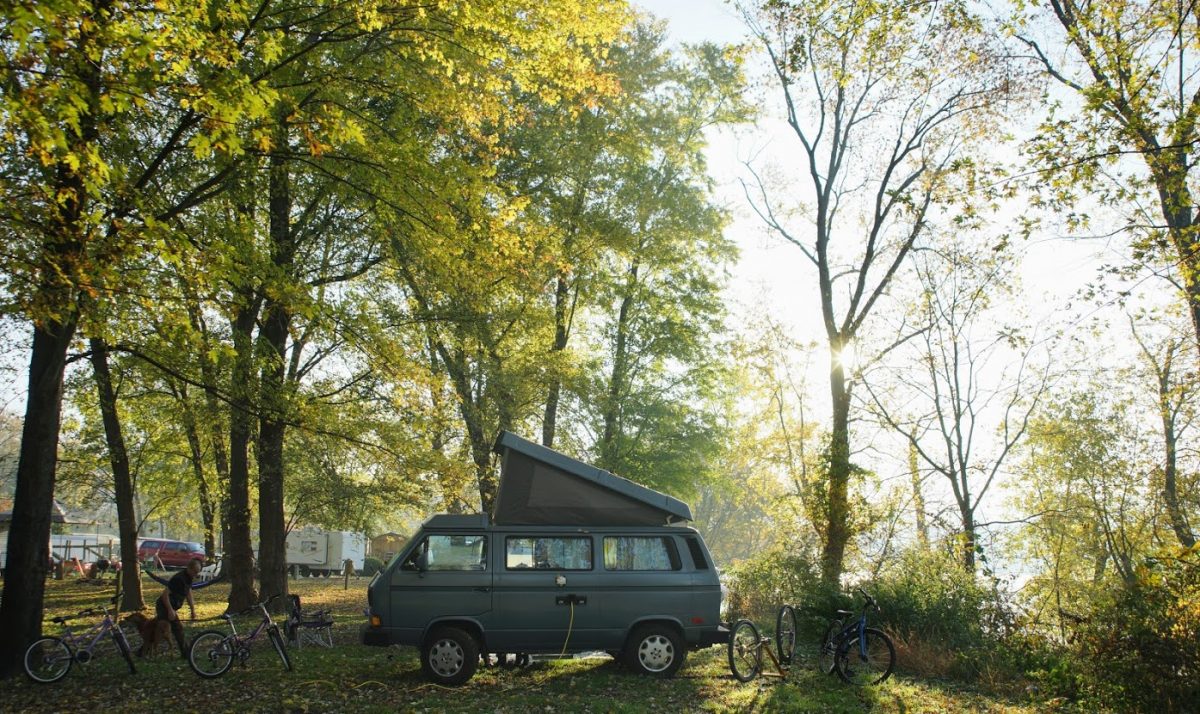
Many classic car enthusiasts have turned to restoration projects to stave off boredom during the COVID-19 lockdown. Mike Hanyi, a former automotive mechanic from Towson, Maryland, is one of them. But while he has enjoyed the quality time with Bonny, his yellow 1984 Vanagon Westfalia, he felt that something was missing: a sense of community.
Hanyi has been a Volkswagen fan for decades but is relatively new to van culture. On a trip to Arizona in 2017, he borrowed a friend’s Volkswagen Westfalia and drove across the Southwest region with his wife, Mary.
“We immediately fell in love with it,” said Hanyi. “I sold off my other vintage vehicles to buy one.” He purchased a Vanagon later that year and since has traveled up and down the East Coast with his family, attending events with other Vanagon devotees. He owns two other Volkswagens — a 1992 Cabriolet and a 2014 TDI Wagon — but Bonny is his most prized possession.
Many of the Vanagon events that have become annual traditions for Hanyi were canceled over the past year due to COVID-19. Although he remains active in the Volkswagen community through social media, Hanyi missed the immersive experience of in-person, weekend-long events with other van owners and their families. He spoke with others from the Maryland van community online, and they too wanted a way to safely connect with one another.
As the weather got cooler, Hanyi decided to create his own tradition: a small outdoor meet-up of Volkswagen buses at a local campground in Maryland. While he had attended several van events before, this was his first time organizing one. Hanyi found a large nearby campsite and gauged interest in meeting for a weekend in early November with the group.

“I expected 10 vans to show up,” he said. “Instead, we had about 30 vans, all from the Maryland area.” This was the first time the Maryland social media group, which was formed just a year ago and now has over 150 members, had come together for an event. While COVID-19 posed challenges for gatherings of this size, Hanyi saw the outdoor setting, individual sleeping arrangements, and masks as a solution.
“This type of event would really only work with a Vanagon or another camper van,” said Hanyi. “It’s allowed us to get outside and see new places without flying or staying in hotels. We’re blessed that we’ve got our own isolated little home that we can take with us.”
Although it was the attendees’ love for the Vanagon that brought them together, Hanyi said the group soon bonded over more than vehicles. Many of the families went hiking or bicycling along the nearby Potomac River and got to know one another over socially distant campfire chats.
“It wasn’t just the men talking about mechanics with the hoods of our cars open,” Hanyi said. “Yes, we were there because we love our vans, but the event is about traveling with your family to a scenic location to relax. There’s something for every member of the family to enjoy, even if cars aren’t your thing.”
Like Hanyi, some of the attendees had been to several van meetups over the years, including larger festivals in different areas of the country. For others, it was their first time.
“It didn’t matter if you were a veteran van-lifer or if it was your first event. Everyone was welcoming,” Hanyi said. He was happy to initiate the new attendees into Maryland’s van culture. “It was a really nice feeling to know that we could bring a sense of community to them during a difficult time and do it in a safe way.”
After just one weekend, Hanyi described the event attendees as a “family,” with members extending their friendship and support to one another — whether that meant sharing their stories, an extra vehicle part or even vegetables from their home gardens.
While next November is months away, Hanyi is committed to keeping the tradition going. “The sense of community I felt at the meet-up was incredible, especially after this past year,” Hanyi said. “I was happy to have created that feeling for everyone who attended, and I know it’ll be something we all look forward to for next year.”

